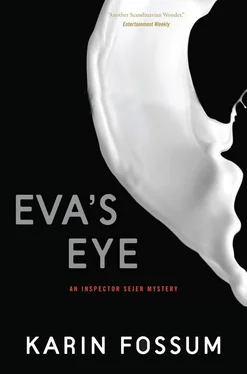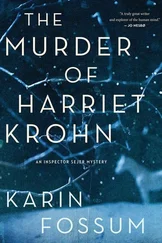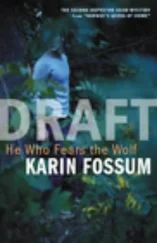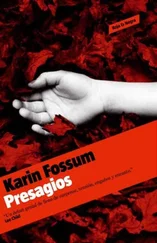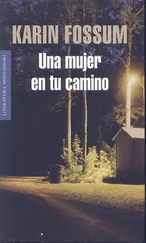Larsgård sounded like a bit of an old fogey. Why didn’t the name and number correspond? He puzzled over this as he drove south, as sedately as a clergyman, past the power station and the campsite, watching the traffic behind him in the mirror and allowing drivers to pass when they got impatient; everyone who found themselves behind Sejer on the road became impatient, a fact he accepted with perfect equanimity. When he got to the flatbread factory he turned to the left, drove for a couple of minutes through fields and meadows, and ended up at a cluster of four or five houses. There was also a diminutive smallholding on the periphery. Larsgård lived in the yellow house, which was rather pretty, very small with brick-red bargeboards and a little lean-to adjoining it. He parked and ambled over to the steps. But before he reached them, the door opened, and a thin, lanky man appeared. He was wearing a knitted jacket and checked slippers and he supported himself on the door frame. He had a stick in his hand. Sejer ransacked his memory, something about the old man seemed familiar. But he couldn’t think why.
“Did it take you long to find me?”
“No, no, not at all. This isn’t exactly Chicago, and we’ve got the road atlas.”
They shook hands. He pressed the bony hand with a certain caution, in case the man had arthritis or some other painful accompaniment to old age. Then he followed him into the house. It was untidy and comfortable at the same time, and pleasantly dusky. The air was fresh, there was no dust lying in the corners here.
“So you live alone here?” he asked lowering himself into an old armchair of fifties vintage, the sort he found so good to sit in.
“Completely alone.” The man sank on to the sofa with great difficulty. “And it’s not always easy. My legs are rotting away, you know. They’re filling up with water, can you imagine anything worse? And my heart’s on the wrong side too, but at least it’s still ticking. Touch wood,” he said suddenly and rapped his knuckles on the woodwork.
“Really? Is that possible? To have your heart on the wrong side?”
“Oh yes. I can see you don’t believe me. You’re wearing the same expression as everyone else when I tell them. But I had to have my left lung removed when I was younger. I had tuberculosis, was up at Vardåsen for a couple of years. It was all right there, it wasn’t that, but when they took out my lung it left so much room that the whole damned thing began to move to the right. Well, anyway, it’s ticking away as I said, I manage just about. I’ve got an aid who comes once a week. She cleans the entire house for me and does all the washing and throws out the rubbish and the food that’s turned moldy in the fridge over the past week, and gives the house plants a bit of attention. And each time she brings along three or four bottles of wine. She’s not supposed to do it, apparently. Buying wine for me, I mean, only if I’m with her. So she swears me to secrecy. But I don’t suppose you’ll tell. Will you?”
“Of course not.” Sejer smiled. “I always have a whiskey myself before I go to bed, have done for years. And heaven help the aid who refuses to go to the off-license for me, when the time comes. I thought that was what they were for,” he said naively.
“One whiskey?”
“Just one. But it’s pretty generous.”
“Ah, yes. D’you know, there’s actually room for four shots in a glass. I’ve worked it out. Ballantine’s?”
“Famous Grouse. The one with the grouse on the label.”
“Never heard of it. But what brings you here? Did my wife have some guilty secrets?”
“I’m sure she didn’t, but I want to show you something.” Sejer brought out the note from his inner pocket. “Do you recognize that handwriting?”
Larsgård held the paper close up to his face, it shook violently between his trembling fingers. “No-oh,” he said uncertainly, “should I?”
“I don’t know. Perhaps. There’s quite a lot I don’t know. I’m investigating the murder of a thirty-eight-year-old man who was found floating in the river. And he didn’t exactly fall in while he was fishing. The evening he disappeared, which was about six months ago now, he told his wife that he was going out to show his car to someone who’d expressed an interest in it. The man must have made a note of this person’s name and phone number on a piece of paper which, quite by chance, I’ve managed to get hold of. This piece of paper. With the name Liland and your phone number, Mr. Larsgård. Can you explain it?”
The old man shook his head, Sejer could see his brow furrowing. “I won’t even try,” he replied, his voice slightly brusque, “because I don’t understand a thing about it.” Somewhere at the back of his mind he recalled a wrong number. Something about a car. How long ago had that been? Maybe six months, maybe he ought to mention it. He let it go.
“But are there people you know on your late wife’s side with that name?”
“No. My wife was an only child. Her family name has gone now.”
“But someone used it. Presumably a woman.”
“A woman? There are lots of people called Liland.”
“No, only six in this town. None with this number.”
The old man took a cigarette from the packet on the table and Sejer lit it for him.
“I’ve no more to add. It must be a mistake. And the dead don’t go around buying secondhand cars. And anyway she couldn’t even drive. My wife, I mean. I suppose he hadn’t even sold his car, if you found him dead. Doubtless because he had the wrong number.”
Sejer said nothing. He was looking at the old man as he was speaking, then his eyes wandered thoughtfully over the walls. Suddenly, his grip tensed on the arms of his chair and he felt the hairs on his neck rising. Above Larsgård’s head was a small painting. It was black and white with a little gray, an abstract painting, the style seemed strangely familiar. He closed his eyes for an instant then opened them again.
“That’s rather a nice picture you have there, above the sofa,” he said quietly.
“Do you know about art?” he asked quickly. “D’you think it’s good? I told my girl she ought to paint with colors, then she might be able to sell them. She tries to make a living from it. My daughter. I don’t know much about art, so I can’t say if it’s good or not, but she’s done it for years and it hasn’t made her rich.”
“Eva Marie,” Sejer said softly.
“Yes, Eva. What? D’you know my Eva? Is it possible?” He was rocking slightly, as if he were anxious about something.
“Yes, a little bit, by chance. Her pictures are good,” Sejer added quickly. “People are a bit slow on the uptake. Just wait, she’ll come into her own, you’ll see.” He rubbed his jaw in disbelief. “So, you’re Eva Magnus’s father?”
“Is there anything wrong with that?”
“Certainly not,” Sejer said. “Tell me, Liland wouldn’t be her middle name or anything like that?”
“No. She’s just called Magnus. And she certainly hasn’t the money to buy another car. She’s divorced now, lives alone with little roly-poly Emma. My only grandchild.”
Sejer rose, ignoring the old man’s astonished look, and pushed his face right up to the painting on the wall. He examined the signature. E. M. Magnus. The letters were sharp and inclined, they were a bit like old-fashioned runes, he thought, and looked down at the note. Liland. Precisely the same letters. One didn’t even need a handwriting expert to see that. He drew breath.
“You’ve every reason to be proud of your daughter. I just had to look into this note. So you don’t know the handwriting?” he asked again.
The old man didn’t answer. He pursed his lips as if suddenly afraid.
Читать дальше
